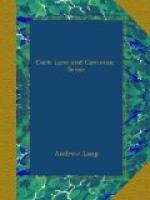Auguier appealed: his advocate urged the absurdity of a ghost-story on a priori grounds: if there was no ghost, then there was no treasure: if there was a treasure, would not the other digger have secured his share? That digger, Bernard, was not called. Then Auguier pled an alibi, he was eight leagues away when he was said to have received the treasure. Why he did not urge this earlier does not appear.
Mirabel’s advocate first defended from the Bible and the Fathers, the existence of ghosts. The Faculty of Theology, in Paris, had vouched for them only two years before this case, in 1724. The Sorbonne had been as explicit, in 1518. ’The Parliament of Paris often permitted the tenant of a haunted house to break his contract.’ {253} Ghosts or no ghosts, Mirabel’s counsel said, there was a treasure. In his receipt Auguier, to deceive a simple peasant, partially disguised his hand. Auguier’s alibi is worthless, he might easily have been at Marseilles and at Pertuis on the same day: the distance is eight leagues.
Bernard was now at last called in; he admitted that Mirabel told him of the ghost, that they dug, and found some linen, but that he never saw any gold. He had carried the money from Mirabel to pay for the masses due to the ghost. Mirabel had shown him a document, for which he said he had paid a crown, and Bernard (who probably could not read) believed it to be like Auguier’s receipt. Bernard, of course, having been denied his share, was not a friendly witness. A legal document was put in, showing that Madame Placasse (on whose land the treasure lay) summoned Mirabel to refund it to her. The document was a summons to him. But this document was forged, and Mirabel, according to a barrister whom he had consulted about it, said it was handed to him by a man unknown. Why the barrister should have betrayed his client is not clear. Mirabel and Marguerite Caillot, his first witness, who had deposed to his telling her about the ghost, and to seeing the excavation of the packet, were now arrested, while Auguier remained in prison. Marguerite now denied her original deposition, she had only spoken to oblige Mirabel. One Etienne Barthelemy was next arrested: he admitted that he had ‘financed’ Mirabel during the trial, but denied that he had suborned any witnesses. Two experts differed, as usual, about Auguier’s receipt; a third was called in, and then they unanimously decided that it was not in his hand. On February 18, 1729, Auguier was acquitted, Mirabel was condemned to the torture, and to the galley, for life. Marguerite Caillot was fined ten francs. Under torture Mirabel accused Barthelemy of having made him bring his charge against Auguier, supplying him with the forged receipt and with the sham document, the summons to restore the gold to Madame Placasse. Oddly enough he still said that he had handed sacks of coin to Auguier, and that one of them was tied up with the gold-coloured ribbon. Two of his witnesses, under torture, stuck to their original statements. They were sentenced to be hung up by the armpits, and Barthelemy was condemned to the galleys for life.




